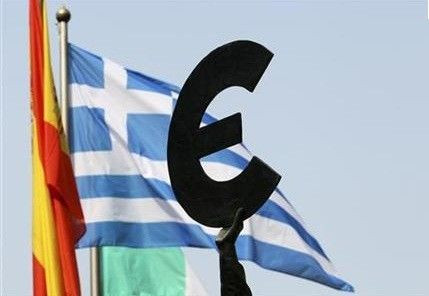Call My Bluff: Greece Dares EU As It Edges Closer To 'Drachmageddon'
ANALYSIS

It has broken the Franco-German alliance, brought a currency to its knees and threatened the very existence of the euro zone.
Greece, a country that accounts for less than 2 percent of the European Union's GDP (with an economy roughly the same size as that of Massachusetts), continues to frustrate EU leaders as they plead and threaten the Mediterranean basket-case to abide by a harsh medicine of tax rises, welfare cuts and liberalization.
On Wednesday night, Greece dominated the agenda in Brussels, where French President Francois Hollande and German Chancellor Angela Merkel once again butted heads over which direction to take European recovery.
Predictably, Hollande championed the idea of euro bonds -- a financial instrument he says can be used to stimulate growth and save the euro.
Merkel, who has staked her political career on advocating austerity, rejected the idea out of hand, saying the bonds would violate EU treaties and would not contribute to kick-starting growth.
During their less-than-cordial dinner date, the 27 heads of the euro zone talked a lot and decided little, agreeing to meet again on June 28.
By then, however, the political landscape could have changed irrevocably.
On June 17, Greece will go to the ballot box for a second time.
And if the Greek people elect the vehemently anti-austerity radical leftist Syriza party, as polls suggest they will, then a euro exit seems inevitable.
But as Athens inches closer to Drachmageddon, the Greek people seem incapable of grasping the seriousness of their situation.
Despite the growing feeling a Greek exit is not only possible, but a survivable event, the Greek public continues to goad Brussels from the sidelines.
The perception among Greeks, according to one report, is that they were bailed out before, so why not now?
After all, they say, Europe would not dare throw us out of the single currency.
However bad their prospects, many Greeks seem to think that since money to bail them out was found in the past, it will be found again, whatever politicians say, Reuters reported.
Nor do they believe that Europe will simply cast them loose, despite growing signs that Greece is heading for the exit from the single currency and toward the economic and social catastrophe that would follow.
This contrary attitude is reflected in opinion polls, which show 75 percent of Greeks want to stay in the euro, but two-thirds oppose an international bailout aimed at reducing its 160 percent GDP-to-debt ratio.
Patience among European leaders, and their voters, is swiftly running out.
Germany in particular, acting as paymaster-in-chief for the EU, has grown tired of Greek intransigence, with its ministers actively discussing a Greek exit over the past couple of weeks.
We want Greece to stay in the euro zone, but they also have to want it and meet their obligations, German Finance Minister Wolfgang Schaeuble told German newspaper Rheinische Post earlier this month.
We can't force anyone.
The German Bundesbank has also, ever so politely, talked up the prospect of a previously unmentionable Grexit.
Greece is threatening not to implement the reform and consolidation measures that were agreed in return for the large-scale aid programs, the Bundesbank said in a statement on Wednesday.
This jeopardizes the continued provision of assistance. Greece would have to bear the consequences of such a scenario.
The challenges this would create for the euro area and for Germany would be considerable, but manageable, given prudent crisis management.
And it's not just Germany who is prepared to stare Greece down.
The Swedish financial markets minister said Wednesday his country was well prepared for such an event, while three senior EU officials also told Reuters on Wednesday they had advised European leaders to prepare for a Greek exit from the euro.
The Eurogroup Working Group (EWG), who advise Europe's finance ministers, said they had advised their bosses to prepare just in case the unthinkable occurred.
The EWG agreed that each euro zone country should prepare a contingency plan, individually, for the potential consequences of a Greek exit from the euro, said one euro zone official.
But while the EWG leak prompted a flurry of denials from European leaders, the writing is truly on the wall for Athens' continued membership of the euro.
The real tragedy is that the Greek people, locked in a fantasy world of modern-day myth-making, seem incapable of accepting the seriousness of their situation.
Believing they will somehow muddle through without painful corrections, Greece is enraging its neighbors and pushing itself closer to a devastating currency relegation that could damage the country for decades to come.
© Copyright IBTimes 2024. All rights reserved.





















